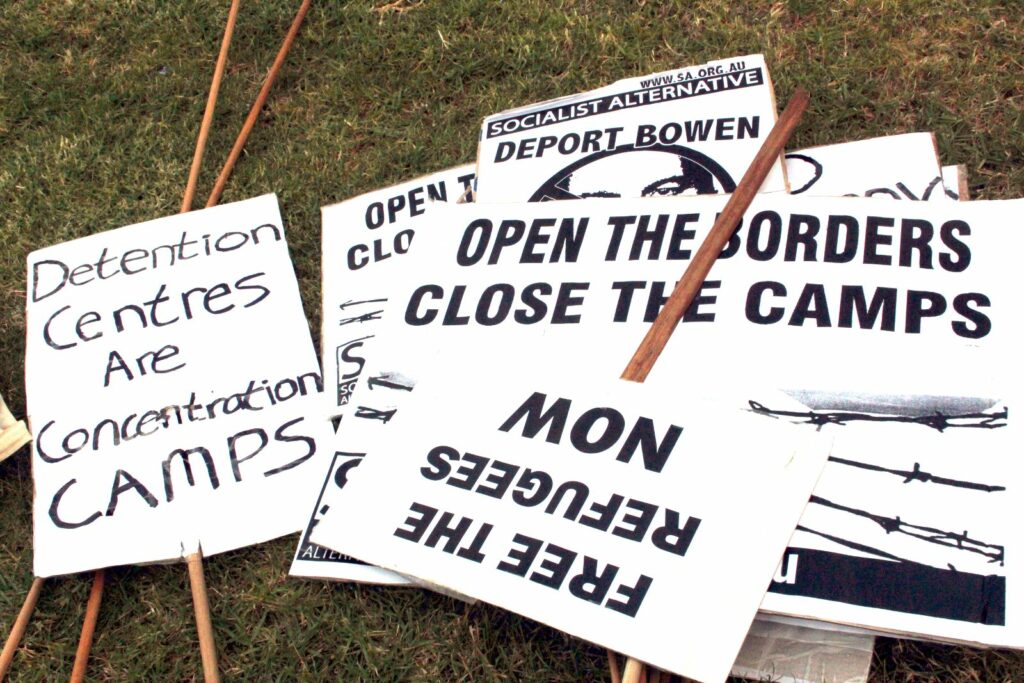EU Member States Bulgaria, Hungary and Croatia have actively been locking up refugees in hidden detention centres before transporting them back across the border. An independent investigation by the research platform Lighthouse Reports shows that this was partly done with the knowledge and funding of the EU. Experts call the inhumane treatment "torture".
Video footage and photographs reveal the so-called black sites and mistreatment of refugees on the EU borders. After last week's footage of a Syrian refugee being shot by Bulgarian border forces shocked international audiences, Lighthouse Reports reveals that this was not an isolated incident but part of a wider system of black sites, cages and torture.
Despite being illegal, the investigation revealed that some of these actions are funded by the EU and operated in plain sight of officers from Frontex, the EU border agency.
Video footage released
In one video, nine migrants are seen squatting in a kind of stable. After some time, a Bulgarian policeman arrives and orders the men outside.
In a video filmed in Croatia, people are seen crammed into the back of a dark van and left inside as the vehicle stands in the sun. Footage of sweating adults and even children inside the van is shown. An Afghan woman told Lighthouse Reports that they were with 20+ people, including children, in the 8-person van.
In Hungary, refugees were found to have been held in shipping containers with no access to food, water or toilets before being driven back to Serbia. In Greece, migrants are taken by vans without number plates to former army bases.
These secret prisons for those forced to flee their home countries have long been rumoured. Consequently, Lighthouse Reports together with European media, including Der Spiegel and Le Monde spent months investigating the border prisons.
Clearly illegal, possibly torture
Experts in international law are clear that these are illegal practices. "It’s being done to punish, deter and intimidate and therefore it meets the widely recognised UN definition of torture," said Liz Bates, lead doctor at Freedom from Torture.
Migrants and refugees also spoke to the researchers with one man from Syria telling Der Spiegel that he wanted to request asylum in the EU as Turkey is increasingly repatriating Syrians and that he feared for his life should he end up in Damascus. Officially, the man never entered the EU although he spent three days locked in a horse stable. He was later sent back across the border.
Though clearly illegal under the European Convention on Human Rights, the pushbacks have become a structural part of European border enforcement with several Member States especially prone to the violations.
With EU support
To make matters worse, the investigation showed that the EU is likely aware of the illegal practices. For example, in Bulgaria, the stable in which refugees are held is behind the regional border police headquarters in Sredets, a town in the east where ten Frontex agents are stationed. Footage released by Lighthouse Reports shows Frontex vehicles patrolling close to the stables.
Frontex is the EU's best-funded agency and is run by envoys from the Member States and the European Commission. The detention centres are sometimes directly funded by the EU. For instance, the Bulgarian police station in Sredets was renovated with EU funds of €206,000 in 2014 and 2017, investigators showed.
Related News
- 'Shocking footage' shows young Syrian refugee being shot by Bulgarian police on EU border
- EU's latest Migration Action plan branded 'waste of time'
In addition, Bulgaria, Croatia and Hungary received €320 million, €163 million and €144 million respectively from the European Internal Security Fund and the Asylum, Migration and Integration Fund. Hungary had reportedly bought three prison buses for €1.7 million; these are used for illegal deportations, Dutch newspaper Trouw reported.
"These places aren't even close to being legal," specialist in International and European Law Dana Schmalz told Trouw.
Actions speak louder than words
"Every year the gap grows between what the EU tells you and what happens on the ground," De Standaard reports. Only last week, when Croatia joined the Schengen zone, did the Commission state that the country's border policy was in line with international law. A report on Croatia by the European Committee for the Prevention of Torture (CPT) was excluded from the accession dossier.
Worryingly, violent pushbacks committed in Greece have not been penalised at the EU level. Other abuses in Bulgaria and Poland have been met with little official reproach.
Some refugees and migrants that investigators spoke to stated their intention to cross the borders again, proving that the barbaric practices are failing as a deterrent to desperate people.

